Professional voice actor, artist, bestselling author and show host.
Friday, June 29, 2012
Mark Million: Santorum: Romney's health law 'hasn't worked'
Mark Million: Santorum: Romney's health law 'hasn't worked': CNN's Kevin Liptak (CNN) – Rick Santorum didn't hold back Thursday when describing the Massachusetts health plan put in place by Mitt Ro...
Santorum: Romney's health law 'hasn't worked'
CNN's Kevin Liptak
(CNN) – Rick Santorum didn't hold back Thursday when describing the Massachusetts health plan put in place by Mitt Romney, saying the measure pushed through by the GOP presidential candidate left the Bay State with high costs and uninsured citizens.
"I think what you're seeing is it hasn't worked in Massachusetts," Santorum, who has endorsed Romney for president, said of the law on CNN's "Piers Morgan Tonight."
– Follow the Ticker on Twitter: @PoliticalTicker
The former presidential candidate and former senator from Pennsylvania continued: "Health care costs in Massachusetts are number one in the country. They have a series of problems with people who decide to take the tax, in other words, pay the fine, instead of buying insurance, because it's cheaper. It doesn't work."
Santorum, who battled Romney for the GOP nomination in the winter and spring of 2012, used the Massachusetts health law frequently on the stump during the primary contests. In March, Santorum stood on the steps of the Supreme Court to blast Romney as the "worst candidate" to take on the president on health care.
Asked why Romney would make a good pick for president if his record on health care in Massachusetts was so dismal, Santorum said Thursday that Romney himself had acknowledged mistakes in the measure.
"What he said is they did some things right. They did some things wrong. He learned from those mistakes. I'm using his language," Santorum said.
Romney has said that there were things he would do differently on the Massachusetts health law if given the chance, though he still stands by the measure as necessary and successful in the Bay State.
"Overall, ours is a model that works," Romney said in March at an event in Iowa. "We solved our problem at the state level. Like it or not, it was a state solution."
Thursday, June 28, 2012
Supreme Court upholds Obamacare individual mandate as a tax
By Liz Goodwin, Yahoo! News | The Ticket
In a victory for President Barack Obama, the Supreme Court upheld his signature health care law's individual insurance mandate in a 5-4 decision, upending speculation after hostile-seeming oral arguments in March that the justices would overturn the law. The mandate has been upheld as a tax, with Chief Justice John Roberts, a Bush appointee, joining the liberal wing of the court to save the law.
In brief comments Thursday afternoon, Obama called the decision a win for Americans. "With today's announcement it is time for us to move forward to implement and, where necessary, to improve this law," he said. Mitt Romney told reporters shortly before noon that he would repeal the law his first day in office if elected. "ObamaCare was bad policy yesterday, it's bad policy today," he said.
The court's four liberal justices agreed that the individual mandate should be upheld as part of Congress' power to regulate interstate commerce, but Roberts disagreed, and wrote that the mandate is actually a tax, despite the Obama administration's reluctance to describe it that way during the bill's passage. In its argument to the court, the government left open the possibility that the mandate is a tax, but did not rely much on that argument. Under the law, people who do not have health insurance will have to pay 1 percent of their income to the IRS starting in 2014. (There are exceptions for some religious beliefs and financial hardship.)
"If an individual does not maintain health insurance, the only consequence is that he must make an additional payment to the IRS when he pays his taxes," Roberts writes. He adds that this means "the mandate is not a legal command to buy insurance. Rather, it makes going without insurance just another thing the government taxes, like buying gasoline or earning an income."
A footnote flagged by SCOTUSblog's Amy Howe explains the reasoning further. "Those subject to the individual mandate may lawfully forgo health insurance and pay higher taxes, or buy health insurance and pay lower taxes. The only thing that they may not lawfully do is not buy health insurance and not pay the resulting tax."
Justice Anthony Kennedy, usually the court's swing vote, dissented, reading from the bench that he and three conservative justices believe "the entire Act before us is invalid in its entirety." In a 65-page dissent, he and Justices Antonin Scalia, Clarence Thomas and Samuel Alito dismissed Roberts' arguments, writing that there is a "mountain of evidence" that the mandate is not a tax. "To say that the individual mandate merely imposes a tax is not to interpret the statute but to rewrite it," they wrote.
Twenty six states sued over the law, arguing that the individual mandate, which requires people to buy health insurance or face a fine starting in 2014, was unconstitutional. Opponents cast the individual mandate as the government forcing Americans to enter a market and buy a product against their will, while the government countered that the law was only regulating a market that everyone is already in, since almost everyone will seek health care at some point in his or her life.
Before oral arguments in March, most Supreme Court experts and scholars believed the mandate would be upheld as an exercise of Congress' power to regulate interstate commerce. But after justices seemed deeply skeptical of the mandate in oral arguments in March, the consensus flipped, with most experts guessing the court would strike down the law.
House Republicans have vowed to repeal the entire law, though it's unlikely the Democratic-controlled Senate would let that happen, and this decision may slow momentum for that move. "Today's ruling underscores the urgency of repealing this harmful law in its entirety," House Speaker John Boehner said in a statement.
Seven of the nine justices agreed that the law's expansion of Medicaid to an estimated 16 million low-income people by 2014 is unconstitutional as it was written. The court decided that the federal government cannot threaten to withdraw existing Medicaid funds from states if they don't expand Medicaid. Instead, the government can only withhold future funds. It's unclear if that will mean fewer than the 16 million projected will gain coverage.
Though the sweeping, 1,000-page plus law passed more than two years ago, much of it will not go into effect until 2014. That's when states will have to set up their own health insurance exchanges, payroll taxes will go up on higher-income workers, and Americans will have to buy health insurance (for many, with a government subsidy) or pay a penalty of 1 percent of their income to the IRS. Employers who have more than 50 employees and don't offer insurance will also begin to face a penalty. Insurers will no longer be able to turn away people with preexisting conditions, or charge people higher premiums based on their gender or health. In August, health care plans will have to offer preventative services--including birth control--at no extra cost to customers.
An estimated 32 million uninsured people will gain coverage under the law, according to the Congressional Budget Office.
Wednesday, June 27, 2012
On Orbitz, Mac Users Steered to Pricier Hotels?
Orbitz has found that Apple users spend as much as 30% more a night on hotels, so the online travel site is starting to show them different, and sometimes costlier, options than Windows visitors see. Dana Mattioli reports. Photo: Bloomberg.
By DANA MATTIOLI
Orbitz Worldwide Inc. OWW 0.00% has found that people who use Apple Inc.'sAAPL +0.22% Mac computers spend as much as 30% more a night on hotels, so the online travel agency is starting to show them different, and sometimes costlier, travel options than Windows visitors see.
The Orbitz effort, which is in its early stages, demonstrates how tracking people's online activities can use even seemingly innocuous information—in this case, the fact that customers are visiting Orbitz.com from a Mac—to start predicting their tastes and spending habits.
Apple is practically creating its own demographic, and researchers are trying to define it. Their goal: to see if higher income levels translate into higher spending. Read more .
Orbitz executives confirmed that the company is experimenting with showing different hotel offers to Mac and PC visitors, but said the company isn't showing the same room to different users at different prices. They also pointed out that users can opt to rank results by price.
Orbitz found Mac users on average spend $20 to $30 more a night on hotels than their PC counterparts, a significant margin given the site's average nightly hotel booking is around $100, chief scientist Wai Gen Yee said. Mac users are 40% more likely to book a four- or five-star hotel than PC users, Mr. Yee said, and when Mac and PC users book the same hotel, Mac users tend to stay in more expensive rooms.
"We had the intuition, and we were able to confirm it based on the data," Orbitz Chief Technology Officer Roger Liew said.
Journal Community
The sort of targeting undertaken by Orbitz is likely to become more commonplace as online retailers scramble to identify new ways in which people's browsing data can be used to boost online sales. Orbitz lost $37 million in 2011 and its stock has fallen by more than 74% since its 2007 IPO.
The effort underscores how retailers are becoming bigger users of so-called predictive analytics, crunching reams of data to guess the future shopping habits of customers. The goal is to tailor offerings to people believed to have the highest "lifetime value" to the retailer.
Orbitz first confirmed Mac users' preferences in October and began working them into the complicated mix of factors that determine its search results. The effect isn't always obvious. In tests performed by The Wall Street Journal, search results for hotels in cities including Las Vegas, Orlando, Philadelphia and Boston were the same for both Macs and PCs. A New York search turned up more expensive hotels for Mac users, but only after the first 20 listed.
Other searches showed more significant differences. A Mac search for a hotel in Miami Beach for two nights in July displayed costlier boutique hotels on the first page of results, such as Sagamore, the Art Hotel and the Boulan South Beach, that weren't displayed on the PC's first page. Among hotels appearing in both searches, some pricier options (such as the $212 Eden Roc Renaissance and the $397 Fontainebleau) were listed higher on the Mac. Overall, hotels on the first page of the Mac search were about 11% more expensive than they were on the PC.
Similarly, hotels on the first page of results for Baton Rouge, La., appeared in different order for Mac and PC and were 13% more expensive in aggregate for the Mac search.
Rival travel sites Expedia Inc., EXPE +0.32% Priceline.com Inc. PCLN +0.72% and Travelocity, which is a unit of Sabre Holdings Corp., don't use a person's computer operating system when suggesting hotels, spokesmen said. Apple declined to comment.
Associated Press
Orbitz found Mac users on average spend $20 to $30 more a night on hotels than their PC counterparts.
Mac vs. PC
Top hotels measured by booked-room nights by Mac and non-Mac users in selected cities in May:
Mac users
- Las Vegas -- Excalibur Hotel & Casino
- New York -- Park Central New York
- Los Angeles -- Hollywood Roosevelt Hotel
- Miami -- Hyatt Regency Miami
- Chicago -- Congress Plaza Hotel
Non-Mac users
- Las Vegas -- Stratosphere
- New York -- Park Central New York
- Los Angeles -- The Wilshire Hotel
- Miami -- Miami Beach Resort
- Chicago -- The Whitehall Hotel
Source: Orbitz
Neil Sazant, president of Sagamore, reacted with a mix of admiration and concern to the algorithm. "That's incredible, but I wouldn't want to miss out on PC users," he said. Mr. Sazant says about 15% of rooms at the 93-room hotel are booked through a mix of online sites like Orbitz and that appearing on the first page of results is important in those searches.
Orbitz's chief executive, Barney Harford, has made data mining a priority. Shortly after joining the company in 2009, the former Expedia executive opened a small office in Sunnyvale, Calif., and recruited statisticians with backgrounds from eBayInc. EBAY +1.66% and Google Inc.GOOG +0.71% for a new analytics team.
Digging into the data, the team found some hotels were far more likely to be booked by Mac users. Nearly half of bookings on Orbitz for the Public Chicago—a high-end Chicago hotel that boasts features such as "lobby socializing"—come from Mac visitors, said Mr. Liew of Orbitz.
Erica Spayd, a store designer from Queens, N.Y., uses Orbitz to reserve flights and hotels from time to time using her MacBook Pro. "It's clever," the 31-year-old said of Orbitz's Mac targeting. "As long as there's an option to sort by price I'm fine with it."
Orbitz said the effort to incorporate Mac vs. PC distinctions is still in its formative stages and isn't evident across the site. Other factors have more influence over results, Mr. Liew said, including a user's location and history on the site, as well as a hotel's overall popularity and promotions. Still, he said, use of a Mac can influence results.
Apple users already stand out as big spenders. Nearly half of retailers in a recent study by Forrester Research and Shop.org said users of tablets—a large majority of which are iPads—tend to place bigger online orders than users of laptops or desktops. Shoppers on Apple devices like iPhones also outspend shoppers using Android or BlackBerry devices, accounting for half of all mobile purchases, according to International Business Machines, which tracks data from retailers.
Fashion site Rue La La pays close attention to iPhone and iPad users, who account for 75% of all of its mobile orders, said CEO Ben Fischman.
Companies are just starting to look at whether users of Macs, who make up just 9.8% of the U.S. personal -computer market, according to market research firm Gartner, might exhibit similar characteristics.
The average household income for adult owners of Mac computers is $98,560, compared with $74,452 for a PC owner, according to Forrester.
Eventually, Orbitz may start to test if Mac users have identifiable preferences for car rentals and flight bookings. "It would be nice to say they book more Porsches, but at this point we're only looking at hotels," Mr. Yee said.
Tuesday, June 26, 2012
For immigrants and opponents, court's ruling hits their real lives
By Halimah Abdullah, CNN
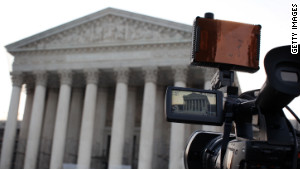 Key parts of immigration law rejected
Key parts of immigration law rejected Labor leader to Arpaio: Law won't stand
Labor leader to Arpaio: Law won't stand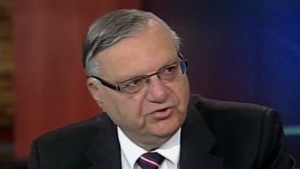 Arpaio: We'll continue to enforce laws
Arpaio: We'll continue to enforce laws
Washington (CNN) -- Jonathan remembers the day, several years ago, when the father of two was forced to sit his young daughter down and explain that, as an undocumented immigrant, she probably wouldn't be allowed to tour the White House with her eighth-grade class.
That day still breaks his heart.
"It's hard because what happens is your hopes begin to fade away and your future is in the short term," Jonathan said. "You're living day-by-day, not by year."
The family, who is living illegally in Florida and asked that their last names be withheld to protect their identities, is one of thousands who have the most at stake following the U.S. Supreme Court's decision to largely overturn Arizona's immigration law.
Political pundits have argued the legal merits of the case for months. But for those in the United States without documentation, those whose job prospects have been usurped by cheaper illegal labor, and the local governments forced to absorb the enormous costs associated with illegal immigration, the case goes far beyond politics.
For them, it is a daily battle between a fear of arrest and deportation and a government some feel hasn't done enough to stop illegal immigration.
The court struck down core portions of the Arizona law in a 5-3 ruling concluding, as Justice Anthony Kennedy wrote in the majority opinion, that "the national government has significant power to regulate immigration."
However, the court also upheld the provision that lets police officers enforcing other laws scrutinize the immigration status of someone if they believe that "reasonable suspicion" exists that the person is in the United States illegally.
"This is a gray day for people like me," reacted Jonathan to that provision, dubbed by critics as "show me your papers." "This basically gives the state of Florida permission to follow in Arizona's footsteps.
"Imagine the exodus of all the people who are afraid," he said. "Families will be separated."
 Key parts of immigration law rejected
Key parts of immigration law rejected Labor leader to Arpaio: Law won't stand
Labor leader to Arpaio: Law won't stand Arpaio: We'll continue to enforce laws
Arpaio: We'll continue to enforce lawsBut both Republicans and Democrats rushed to claim a limited victory.
"I am pleased that the Supreme Court has struck down key provisions of Arizona's immigration law," President Barack Obama said in a written statement Monday.
"At the same time, I remain concerned about the practical impact of the remaining provision of the Arizona law that requires local law enforcement officials to check the immigration status of anyone they even suspect to be here illegally," Obama said.
Republican leaders did not share the same opinion. "Once again we are reminded that President Obama has failed to keep his promise on immigration reform," said RNC Chairman Reince Priebus. "In the absence of presidential leadership, states have acted on their own to serve their people and enforce the law, but the issue cannot fully be resolved with a president unwilling to keep his promises. This decision makes that job even more difficult, and it leaves Americans waiting for a plan the president promised to deliver years ago."
For immigrants such as Jonathan who've spent years living in the shadows, the ruling may offer a glimmer of hope. But it also makes him feel as if life is about to get a lot more precarious.
"When all of this was happening and (Florida's) Gov. (Rick) Scott was talking about the Arizona law and how they wanted to do the same," Jonathan says, his voice breaking. "The walls were closing in on us pretty fast. We were losing hope."
Experts say, at its core, the anxiety over immigration has to do with the nation's drastically shifting racial demographics.
"Most of the vitriol and anxiety people feel about immigration has to do with one simple concept, the changing demographics of America," said CNN contributor Ruben Navarrette.
According to recent Census figures, minorities are half of the U.S. population under age 1. When these children come of age, they could help consolidate a political power base in places like Alabama, Mississippi and Georgia. That political power hold will stretch across the Southwest all the way to California, experts say. The states with the biggest increases in minority birthrates are also the states that had been considering tough laws like Arizona's.
And there are those who still see laws like the Arizona measure as a necessary step to fixing the poor job the federal government has done in resolving the immigration crisis.
"I have a cousin who is in construction. He has had to bring his prices down; he is constantly looking for work; he can't get work as a skilled laborer because he has to compete with the suppressed wages from illegal immigration," said Pauline Olvera, a former small business owner and vice chair of the Denver Republican Party. "We cannot be the only country in the world that doesn't enforce immigration laws."
She said she has watched in frustration as American citizens have been unable to get jobs.
"When illegal immigrants are here...nobody blames them for wanting to pursue the opportunity," she said. "When you have the people here illegally, the opportunity for exploitation in the workforce is higher, and it makes it difficult for American workers to compete for jobs."
Jonathan, an engineer by training, said he understands those concerns. But for him, "it feels like it is Gestapo."
He is one of the lucky ones with government-issued identification. So, he feels a bit safer. For now.
But he's prepared to flee if things take a turn. After all, it's what his close friends plan on doing.
"If I'm pulled over and I'm asked for my papers, I have a license," Jonathan said. "For our (friends), they're going to pack up and go to friendlier pastures. Friendlier states."
Sunday, June 24, 2012
Tropical Storm Debby lashing Gulf Coast with winds, rain
By the CNN Wire Staff
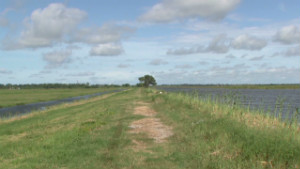 Tropical Storm Debby preps
Tropical Storm Debby preps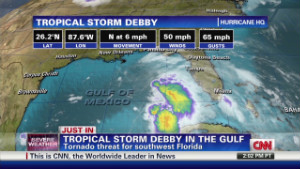
(CNN) -- Tropical Storm Debby was unleashing high winds and torrential rain Sunday along portions of the northeast Gulf Coast as it meandered offshore, forecasters said.
As of 10 a.m. (11 a.m. ET), the center of Debby was about 190 miles east-southeast of the mouth of the Mississippi River and about 140 miles south-southwest of Apalachicola, Florida, according to the National Hurricane Center in Miami. Packing sustained winds of 60 mph, the storm was moving northeast at about 6 mph.
A tropical storm warning was in effect for coastal Louisiana from the mouth of the Pearl River westward to Morgan City, the weather agency said, not including New Orleans or Lake Pontchartrain.
A second warning was extended eastward Sunday from the Mississippi-Alabama border eastward to Florida's Suwannee River, and a tropical storm watch was issued for an area south of the Suwannee River to Anclote Key, Florida.
Some slight strengthening is possible within the next 48 hours, the hurricane center said.
A tropical storm warning means that tropical storm conditions, including sustained winds of 39 to 73 mph, are expected in the warning area within 36 hours, said CNN meteorologist Bonnie Schneider.
"If you are under this warning, take your precautions now," she said. "Tie down or bring inside any furniture, toys or decorations you keep outside. They may blow about in strong winds and cause damage or injuries.
"If you are in a low-lying area at risk for flooding, know the best route to higher ground where you live," Schneider said, and stay abreast of local weather warnings.
A tropical storm watch means tropical storm conditions, including winds of at least 39 mph, are possible within the watch area within 12 to 24 hours, the hurricane center said.
The forecast track shows Debby strengthening into a hurricane early Wednesday off the coast near the Mississippi-Alabama state line, then coming ashore in coastal Louisiana early Thursday.
However, uncertainty remains about Debby's track, said Dave Hennen, CNN senior meteorologist, and computer models show a wide variety of places where the storm may make landfall, from the upper Texas coast to the Florida panhandle.
"We must be ready to make a change of the forecast track at any time," hurricane center forecasters said.
If Debby does continue toward Louisiana, warnings including New Orleans may be issued, Hennen said.
Tropical storm-force winds extend outward up to 200 miles from Debby's center, according to the hurricane center.
"Tropical storm conditions are already near or over portions of the northeast Gulf Coast and are expected to reach the remainder of the warning area by tonight," forecasters said Sunday.
Bald Point, Florida, about 45 miles south of Tallahassee, reported sustained winds of 37 mph Sunday morning with gusts to 43 mph, the hurricane center said.
"The combination of a storm surge and the tide will cause normally dry areas near the coast to be flooded by rising waters," the hurricane center said. Floodwaters in parts of coastal Mississippi and Louisiana could reach 2 to 4 feet deep; in Florida's Apalachee Bay, waters could reach 3 to 5 feet.
Debby is also expected to dump 3 to 6 inches of rain from southern Louisiana to the Florida panhandle, with up 10 inches in isolated areas, the weather agency said.
 Tropical Storm Debby preps
Tropical Storm Debby preps
In addition, "isolated tornadoes are possible" over parts of west-central and southwestern Florida on Sunday.
Some adventure-seekers took advantage of high winds and large waves along the shore as Debby approached. A CNN iReporter sent a picture Sunday of a kite surfer on Grayton Beach, Florida.
Nine oil and gas production platforms have been evacuated, equivalent to 1.5% of the 596 manned platforms in the Gulf of Mexico, the federal government said Saturday. One of 70 rigs was evacuated.
Plaquemines Parish, on the southern tip of Louisiana, planned to declare a state of emergency Sunday, said emergency preparedness director Guy Laigast.
The parish expects a slow rise of water pushed by the winds. Crews will place sand bags along a back levee in Myrtle Grove, Laigast said. Louisiana Highway 23, a main road in the parish, could be affected.
St. Mary Parish planned Monday to place warning signs at two communities built at sea level, said Duval Arthur, director of emergency preparedness. "We're anticipating a 3- to 4-foot high tide. Water would be over the road in those areas."
Charles Roeseler, meteorologist with the National Weather Service's Houston-Galveston office, said Saturday that Debby "could really go in a number of directions" -- Florida, Louisiana and Texas. "It would be a welcome rain" in Texas, he said.
Saturday, June 23, 2012
Powerful congressman accused of campaign finance violations
By Scott Bronstein and Drew Griffin, CNN Special Investigations Unit
 Will Congress punt on defense cuts?
Will Congress punt on defense cuts?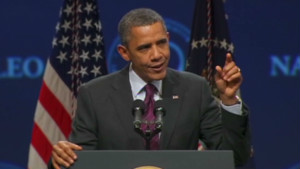 Obama: Congress should fix immigration
Obama: Congress should fix immigration DNC chair:The most 'do-nothing' Congress
DNC chair:The most 'do-nothing' Congress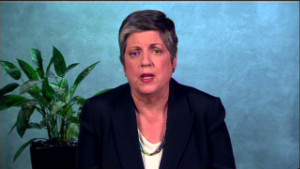 Napolitano: Congress needs to act
Napolitano: Congress needs to act
STORY HIGHLIGHTS
- Four probes looking at various allegations against Rep. Vern Buchanan, R-Florida
- Ex-business partner: Buchanan used cash-swap scheme to finance his campaigns
- FEC initial report finds "reason to believe" Buchanan violated election laws
- Buchanan, a top House GOP fundraiser, says allegations are "politically motivated"
Washington (CNN) -- Republican Rep. Vern Buchanan, a self-made Florida millionaire, is only in his third term in Congress, but he already is in charge of fundraising for the Republican Congressional Campaign Committee, and he sits on the powerful House Ways and Means committee.
But all that could be jeopardized. Federal investigations underway could result in Buchanan serving his next term behind bars.
CNN has confirmed there are no fewer than four congressional and federal investigations into Buchanan's business practices, his campaign finances and his alleged attempt to try to stop a witness from talking.
 Will Congress punt on defense cuts?
Will Congress punt on defense cuts? Obama: Congress should fix immigration
Obama: Congress should fix immigrationNow that witness is stepping forward in an exclusive interview with CNN. Buchanan's former business partner says the congressman schemed to launder money from his car dealerships into his campaign coffers, and then tried to get others to cover it up.
Many of the questions surrounding Buchanan go back to his auto dealerships in Florida where he made his millions, and back to the days when he worked with his former business partner Sam Kazran.
Their partnership started at what is now a weed-filled lot, the former North Jacksonville Hyundai dealership. Eventually they owned four dealerships together.
"I respected him," Kazran says of their early years together. "I believed him."
But Kazran says he was naive, and that he soon found out the man he believed in was interested in only two things: money and power.
"Mr. Buchanan is a very selfish person, and in my opinion people who go to Congress have got to do good for the people they represent," Kazran says.
Kazran presented to CNN the same information, documents and testimony he has given to federal investigators. The two men had a falling out over their finances, and they've been suing each other for years. Buchanan says Kazran is a disgruntled partner and has lied about what happened.
At the center of Kazran's allegations is a cash swap scheme used to finance some of Buchanan's campaigns. He says employees were forced to write checks, then were reimbursed with cash drawn from Buchanan's car dealerships.
"It was to a point where I said, 'Chief, we can't give you this kind of money. At which point he said, 'Just run it through the corporation,'" Kazran said. "What he said to me was 'Get people to write a check to the campaign and then pay them back through the corporation.'"
Kazran did, and he was soon calling in managers, salesman, even assistants. People who never gave money to campaigns were suddenly writing big checks to Buchanan for Congress and, according to Kazran, getting reimbursed from the dealership. It added up to almost $70,000 at Kazran's dealership alone, he said.
"I remember one of the partners jokingly saying, 'Boss, you have all the money in the world. Why do you want us to pay you the money?' And he said, 'Well, it doesn't look good if it's coming from me.'"
Kazran took his detailed allegations to the Federal Elections Commission, which was already looking into Buchanan's campaign finances. Investigators there wanted to know not only about how the cash-swap scheme was set up, but if the congressman knew about it.
Kazran says there is no question the congressman knew all about it.
The FEC's initial report found "reason to believe" that Buchanan "knowingly and willfully violated" federal election laws. Read the initial FEC report (pdf).
But in a later report the FEC pulled back, saying it found credibility problems with both Kazran and Buchanan and not enough corroborating evidence to back up Kazran's testimony.
The FEC then dropped the investigation into Buchanan, stating, "While there is some other evidence in the record that is consistent with Kazran's general allegations, other evidence supports Buchanan's denials or is ambiguous." Read the FEC report (pdf).
The FEC eventually fined Kazran $5,000 in a settlement because he admitted reimbursing employees for campaign contributions. Kazran has never disputed his involvement, but he says he did it because Buchanan told him to.
While the congressman has said the later FEC report proves he's innocent, the findings at the FEC were more convoluted, stating it came "close to supporting a finding that it is more likely than not" that Buchanan violated the law.
And that's where things get much more serious for the congressman.
During the FEC probe, Buchanan pushed to settle a lawsuit Kazran had brought against him. At the last minute, with a $2.9 million settlement offer from Buchanan dangling in front of him, Kazran says he was given an affidavit to sign.
According to Kazran, the congressman and his attorneys were asking him to sign a statement that was a lie, that Buchanan knew nothing about the campaign cash swap.
Kazran says Buchanan and his team were trying to force him to lie about Buchanan's role in the campaign cash scheme in exchange for the nearly $3 million cash settlement, money which Kazran says he desperately needed, as his finances were in trouble and his wife was suffering from cancer and was undergoing expensive medical treatments.
"A lot of the language of it was really to distance himself...," said Kazran. "In short it said that Mr. Buchanan had nothing to do with it."
Kazran's lawyer, Robert Stok, says it was clearly an effort to lean on Kazran when he was vulnerable.
 DNC chair:The most 'do-nothing' Congress
DNC chair:The most 'do-nothing' Congress Napolitano: Congress needs to act
Napolitano: Congress needs to act"He was holding the settlement in escrow," Stok says. "He basically said, 'We can settle, but there's one little thing remaining. All you have to do is sign this affidavit. We release the settlement and everything will be rosy for you.'"
Kazran refused to sign and took the affidavit to federal investigators. Now, CNN has learned that Buchanan is being investigated for attempting to tamper with a witness in a federal investigation.
After CNN's repeated requests for interviews were ignored, CNN decided to find Buchanan as he emerged from a hearing.
Buchanan would not respond fully to any questions and quickly walked away from CNN's camera. When asked if he tried to get Kazran to sign the affidavit, Buchanan responded "No, no, no, no. No I didn't," adding that he needed to get to another meeting, and that CNN should contact his office. When asked if he used the affidavit to hold up the $3 million settlement with Kazran, Buchanan replied: "No."
In a recent report, released quietly several weeks ago, the Office of Congressional Ethics wrote: "There is substantial reason to believe that Buchanan attempted to influence the testimony of a witness in a proceeding before the FEC in violation" of federal law and House ethics code. Read the OCE's report on the affidavit (pdf).
Now a full House ethics committee is looking into it. CNN has also learned that the FBI is conducting its own investigation.
In addition, the Office of Congressional Ethics also found "substantial reason to believe" that Buchanan failed to disclose unearned income on his financial disclosure forms from 2007 to 2010. Read the report (pdf).
Salvatore Rosa, a former chief financial officer for Buchanan's business interests for five years, said in a recent deposition conducted by Buchanan's attorney that he submitted a federal whistle-blower complaint to the IRS with allegations that Buchanan violated federal tax laws, including tax evasion, fraud and conspiracy to commit tax evasion.
In the deposition, Buchanan's attorneys asked Rosa if he stood to gain a "financial windfall" by filing the complaint. Rosa said "potentially." The deposition did not provide details of the alleged violations of tax law. Rosa declined an interview with CNN.
Buchanan's office responded to CNN's interview request with a statement saying the charges are "politically motivated," that the congressman did nothing wrong, and "We are confident that the Justice Department and House Ethics Committee will reach the same conclusion."
On Friday, lawyers for Buchanan filed a legal motion in Sarasota, Florida, to seal all documents in the Kazran case and to stop Kazran and his lawyers from speaking publicly about it.
Buchanan's lawyers said news stories about the congressman are "publicly disparaging" his character.
Stok said: "As an American citizen, both Congressman Buchanan and I have the fundamental right of free speech. ... Mr. Buchanan's motion is yet another in a series of frivolous efforts to attempt to shut down the case ... and to conceal his wrongdoing behind a shroud of secrecy."
Subscribe to:
Posts (Atom)

![[image]](http://si.wsj.net/public/resources/images/MK-BU896_APPLE_A_20120610190759.jpg)




